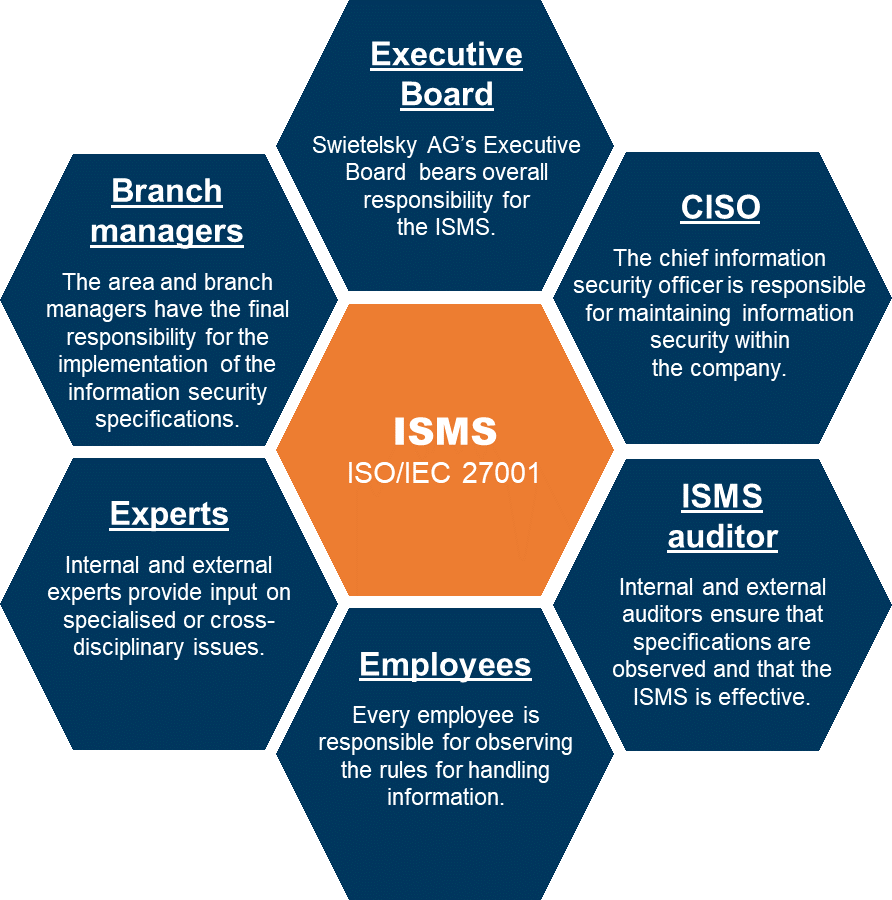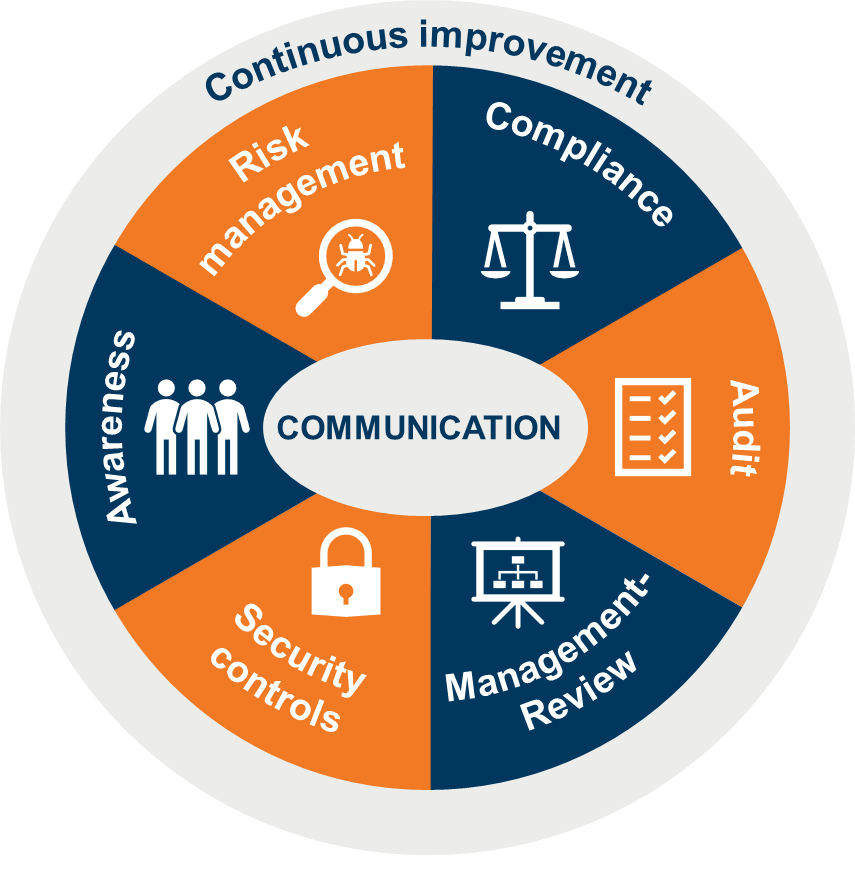expand

expand

expand

As one of the leading companies in Austria’s construction industry, SWIETELSKY is committed to its employees, customers and contractual partners to implement the highest standards throughout all group units.
Due to the legal requirements imposed on the company, and also because of commercial needs, close attention is therefore paid to information security within the company.
SWIETELSKY defines information security as the protection of physical and electronic information as well as the systems necessary to process information with regard to their confidentiality, integrity and availability.
The scope of this Security Policy covers Swietelsky as a group and its subsidiaries with all their employees, locations and services.
The SWIETELSKY Board of Directors hereby adopts the Information Security Policy as an integral part of its corporate strategy.
The board supports the goals and principles of information security in line with the business strategy and business objectives.
By establishing an Information Security Management System (ISMS) and providing the necessary resources, the board of directors is laying the groundwork for achieving the goals of the ISMS. As the highest governing authority of the ISMS, the board of directors actively contributes to the success of the ISMS.
SWIETELSKY's business operations largely depend on the availability of information and increasingly on its information systems working properly. Information processing and digitalisation is becoming more and more important in the construction industry. Networks within the company as well as with customers, suppliers and joint ventures lend support to the provision of services to a considerable extent. Core system failures can cause damage to the business as well as to SWIETELSKY's reputation within a short amount of time.
Information security creates the necessary trust, both internally and towards customers and partners, to further advance digitalisation and to address the risks it poses. For this reason, the board of directors (or a coordinator appointed by the board) actively pursues information security in terms of legal, technological, and organisational matters.
In 1936, Dipl. Ing. Hellmuth Swietelsky founded the construction company. Today, SWIETELSKY AG is one of the most important companies in Austria’s construction industry, employing a workforce of more than 10,000 on average.
With subsidiaries in 4 core countries (Austria, Germany, Czech Republic, Hungary) and 17 other countries, SWIETELSKY is a privately held company. SWIETELSKY’S operations cover all branches of the construction industry. The Group offers projects of any dimension with the highest quality and flexibility, while always adhering to schedules.
”Profit centre decentralisation, delegated responsibility and profit participation has inspired our motivated and competent employees to have the mindset of entrepreneurs in the company.” – The philosophy of SWIETELSKY
SWIETELSKY is a decentralised organisational structure with various independent divisions operating throughout Europe and Australia. Common services, such as personnel, finance or IT, are managed centrally.
In order to fulfil customer wishes, tender requirements and to control measures, SWIETELSKY also operates other management systems in addition to ISMS. These are operated independently by the respective coordinator, whereby regular coordination ensures that the management systems work in unison.
SWIETELSKY’S operations cover all branches of the construction industry. In order to fulfil its tasks, it is necessary to closely cooperate with various suppliers, clients, subcontractors and other competitors in the form of joint ventures.
There are various interested parties that have requirements of an ISMS from SWIETELSKY.
Contracting parties can reasonably expect that due care is given to their data when handled and also that, above all, operations run smoothly, ensuring the availability of the services.
Internal parties expect services that work and are available at all times. Downtimes should be kept as short as possible and should never be unscheduled. Security should take place in the background and, if possible, should not influence or complicate the tasks at hand. Occasionally, confidentiality demands high standards.
Shareholders expect to be protected against business, legal and reputational risks. The ISMS is meant to use resources more efficiently, with certification generating competitive advantages.
Public administration expects all laws to be abided by. All transmitted information must arrive correctly and completely in due time at the public authority.
The following key roles and responsibilities are defined for the ISMS:

The goals of the ISMS are derived from the principles of SWIETELSKY’s Code of Conduct.
The strategic objectives of the ISMS described here are assigned to the operational objectives. They are measured annually using KPIs.
7.1.1 Avoiding unscheduled downtime of central IT services
Failures of centralised services can have an impact on business operations within a short amount of time and lead to financial loss.
7.1.2 Preventing financial loss from cybercrime
Criminal activities via electronic media can cause serious financial damage.
7.2.1 Protecting the confidentiality of information
Unintentionally disclosing or publishing information can have a critical impact on SWIETELSKY’s reputation and have legal ramifications and contractual implications.
7.3.1 Establishing a state-of-the-art IT level of security
By establishing an ISMS and aligning security measures according to ISO/IEC 27001 as well as an external certification, we prove to third parties that we have a state-of-the-art level of security.
7.4.1 Raising awareness among the workforce
Continuous training courses are the basis for further developing the awareness of Swietelsky’s employees.
7.4.2 Continuously improving the ISMS and security measures
The establishment of a continuous improvement process as part of the ISMS ensures that existing measures are constantly evaluated and further developed and that new, risk-based measures are identified.
To implement this Security Policy, the following core components and processes are established within the ISMS:

Although the scope of this Security Policy and the ISMS covers the entire organisation, external ISO/IEC 27001 certification is limited to the following scope:
The ISMS scope includes the group-wide provision and operation of central IT services and the therefor needed infrastructure in Austria.
Services
The central IT services and the operation of the IT infrastructure are the relevant services for the scope of application.
Processes
The IT operations process is considered the primary object of consideration for the tasks within the scope of application.
Department / Units
The IT & Processes unit with the IT User Service, IT Infrastructure, ERP & Processes and Cyber Security departments are responsible for the scope of application.
Locations
The scope of application includes central IT offices, server and backup rooms as well as IT backup locations in Austria.
Interfaces
Within the scope of application, various interfaces closely cooperate, such as HR, quality management, digitisation, facility management, legal as well as service providers and outsourcing partners.
IT systems & applications
The scope includes mobile and stationary IT equipment, storage solutions and related backups, access control and user administration, as well as construction and personnel software.
Legal units
All processes, persons, departments and locations relevant to the scope of application are part of SWIETELSKY.
Information
The scope of application includes all information relevant for providing services.